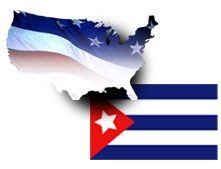
Historians will tell you the Cold War officially ended several decades ago.
Only not between Cuba and the United States.
Even today, as the back-and-forth diplomatice dance illustrates, harsh feelings and distrust between the two nations still linger.
Overcoming 60+ years of a politically severed relationship is not a simple task.
Starting in 2011, negotiators for the two nations began to make progress. Some differences were resolved. Yet, various matters remain unresolved.
With a presidential election around the corner . . .
. . . the odds of reaching a balanced solution is unlikely in the near future.
The future of the Cuban Adjustment Act, a green card program that was given birth by the Cold War animosity of the U.S. and Russia, is one such issue.
Cuban Deportations: A Step Forward Or Backwards For U.S. Foreign Policy?
A few weeks ago, the Miami Herald reported the U.S. had deported 120 Cubans. It was one of the largest Cuba deportation missions in recent history.
No advance notice had been provided.
The 120 individuals removed may be only the tip of the immigration iceberg.
At last count, over 37,000 Cubans are facing deportation related to criminal convictions or immigration violations. Nearly 2,000 are detained at ICE facilities.
Most are under orders of supervision. They must check in at least once per year.
However, it is not clear if the individuals recently deported were Cubans who have resided in the U.S. for several years, or were new arrivals seeking asylum.
ICE has publicly refused to provide a breakdown of the Cubans who have been deported.
Roots Of Cuban Deportation Policy
The news about the Cuban deportations is a microcosm of the Trump administration’s anti-immigration actions toward immigrant communities.
The genesis for the removals can be traced to the January 12, 2017 Cuban Migration Accord signed by President Obama with Cuba.
Under the terms of the Accord, Cuba has to accept all Cubans who unlawfully enter or who are living without permission in the U.S., as of the date of the signing.
In addition, the Accord eliminated the “wet foot, dry foot” policy that provided a special green card path for Cubans and staved off deportation measures against them.
This meant that Cubans, formerly granted a special entry permit known as parole if they managed to make it onto U.S. soil by land, air, or sea, can only gain entry if they request asylum through the normal refugee process. The purpose was to cut off the chances of Cuban immigrants for winning permanent residence by virtue of living legally in the U.S. for a year and one day.
In short, the intent was to dramatically reduce the benefits emanating from the Cuban Adjustment Act.
Cuban Immigration In The Age Of Trump
The mass deportation is in line with the approach of other Cuban policies imposed by the current administration toward Cuba and Cuban immigrants. Under Trump, the U.S. government has:
- Tightened restrictions on travel to Cuba
- Allowed lawsuits in U.S. courts against anyone who profits from Cuban properties seized by the Castro government
- Imposed sanctions on cargo ships that deliver Venezuelan oil to the island
- Limited tourist visas for Cubans one three-month visit, down from multiple visits for up to five years
- Reduced personnel and suspended nearly all visa processing at the American Embassy in Havana
- Restricted the amount of money Cuban Americans can send to relatives on the island, and prohibited remittances to government officials and members of the Communist Party
Are Cuban Asylum Seekers Being Deported?
Immigration lawyers in Florida assert the recent Cuban deportees included asylum seekers who passed “credible fear interviews” but were not represented by attorneys.
In the view of Randy McGrorty, Executive Director of Catholic Legal Services, “South Florida should be up in arms.”
40,000 migrants are waiting their turn along the U.S. – Mexico border to be interviewed for asylum, over. Over 20,000 are from Cuba.
They are stuck in Mexico as part of Migrant Protection Protocols agreement with Mexico.
The agreement, reached after President Trump threated tariffs on Mexican products, requires immigrants from Latin America seeking U.S. asylum to wait on the Mexico side of the border until their cases are decided by U.S. immigration officials.
Following the end of the wet foot, dry foot policy, it was not surprising that the number Cuban immigrants arriving at American ports of entry seeking asylum through normal channels would increase.
Soon after the policy demise, the New York Times reported that “tens of thousands” of Cuban immigrants were now flying to Ecuador, a country which did not require a travel visa. From there, they would travel through Colombia, Panama, Costa Rica, Nicaragua, Honduras, Guatemala, and Mexico in hopes of reaching the American border.
Due to problems with smuggling rings and the refusal of the Costa Rica government to let them pass through their borders, several thousand changed course to El Salvador, from where they traveled on to Guatemala. Their main ports of entry shifted from Florida to Texas.
Cuban immigrants are now the largest contingency of U.S. asylum seekers waiting for their interviews at the Mexican border.

How Does The 2017 U.S. – Cuban Migration Accord Work?
Under the Accord, Cuba retains discretion to accept or reject Cubans who immigrated to the U.S. before the it was signed in January 2017.
In addition, Cuba has 90 days to accept or reject taking back one of its citizens.
If they are not accepted, the U.S. Immigration and Customs Enforcement has no choice but to release the person back into the community under an order of supervision, where they have to check in as many times as the government asks them to.
Historically, U.S. officials have labelled Cuba as an uncooperative country.
Thus, when the Cuban government accepted large numbers of Cuban nationals a few weeks ago, it shocked many in the Cuban immigration community.
Since Cuba and the U.S. have not had normal diplomatic relations, Cuban immigrants were immune from deportation. That appears to have changed.
Hedging Political Bets: How Will Deported Cubans Be Treated In Cuba?
Many immigration activists fear how Cuban immigrants will be treated if they are returned to their homeland.
As McGrorty notes, “Let’s see what happens to them upon arrival.”
“Are they going to have access to employment, a place to live? Are they going to have benefits that the other Cubans have?”
A major worry is the deportation of older Cubans with possible healthcare needs. Can the Cuban economy sustain their influx?
Cold War concerns remain prevalent.
“Are they going to face persecution?”, asks McGrorty.
The latter question has particularly serious consequences. Given their protection was due in part to the Cuban Adjustment Act, will the distaste for the government of their homeland affect their reception?
In the past, Cuba refused to accept Cuban nationals because of their anti-Castro political views.
Is such dissent now tolerated?
Why The Increase In Cuban Deportations Policy Is Misguided Immigration Policy
Under the Migration Accord signed by Obama, the goal was to gradually increase U.S. influence on the island. It was surmised the animosity beyween the two nations might diminish over time.
The Trump Administration’s actions, prior to the massive deportations, have moved U.S. foreign policy back into a hard-line political stance toward the Castro regime.
For the Cuban-American community, this approach has long motiviated them to support the Republican Party.
Ileana Ros-Lehtinen, former chairperson of House Foreign Affairs Committee, at the time of the Obama changes, claimed the changes “will not help the Cuban people free themselves from the tyranny that engulfs them.
Marco Rubio, a U.S. Senator, argued, “It is unthinkable that the administration would enable the enrichment of a Cuban regime that routinely violates the basic human rights rights and dignity of its people.”
Yet, the recent deportations move in a direction contrary to Republican policies regarding the Cuban government.
The current deportation mandate compels sending Cuban immigrants back home – without any assurances that human rights abuses abroad have been cured.
As some commentators have stressed, it seems the Cuban community would rise up and vigorously oppose the new Trump deportation policy. After all, relatives and loved ones are in danger of being returned to a government they despise.
The outrage is missing in action.
Moreover, the quietness has enabled the Republican Party, which has greatly benefited from Cuban-American polical support, to remain silent.
Except for a few local representatives, the Democrats are also non-existent. Their non-action is largely driven by their lack of a strong political affiliation with the Cuban-American community.
The president’s throw-back formula does not bode well for future American interests on the island.
On the one hand, U.S. policies toward working openly with Cuba have been curtailed. This is more likely to harm, not help, relations with the Cuban government. The doorway for Russia to step up their influence has been widened.
On the other, the eviction of immigrants who fled Cuba back into a hostile environment is hardly in the best interests of the Cuban community here in the U.S.
The juxtaposition has one common theme: rid the U.S. of all immigrants altogether. Both Cubans already living here and Cubans coming over are not welcomed.
Against this backdrop, the Cuban Adjustment Act will remain on its death bed. The only uncertainty is the date of its passing.
The drafters believed that when a democratically elected government takes over in Cuba, the Act would automatically expire. Unfortunately, international politics does not operate in such a tidy manner.
Like a candle in the wind, the Act’s impact will be extinguished long before its legacy is terminated.
During the interim, perhaps the Cuban-American community will wake up from its 60+ year political serfdom.
As a San Bernardino immigration attorney, I hope the recent deportations serve as an widespread alarm.
The dictatorship of the Cuban government should never have been replaced by the subservience to the Republican party.
It is not too late for the Cuban-American community to stake out its own position that reflects their own needs, not those of a political party, left or right.
Should that happen, we may see the end of the Cold War sooner rather than later.
By Carlos Batara, Immigration Law, Policy, And Politics




